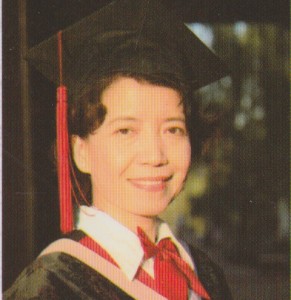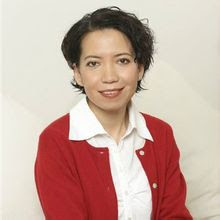RESTARTING TIBETAN-CHINESE RELATIONS BY FACING REALITY
Elite Han Chinese who open their eyes and minds to the realities of Tibet are few, as of yet. Their number is growing, partly because of those pioneers who not only see afresh but also write about it, alerting others to new ways of seeing.
One such is Jin Wei, 靳薇,who momentarily flashed into view for nonChinese in 2013, when she was quoted, in a Chinese language weekly news magazine based in Hong Kong, calling for a fresh approach to the Tibetan issue, while also taking care to tick all the boxes of the official line.
She named the reality that, for Tibetans the gulf of ethnic divide, fuelled by Han chauvinism, is now greater than ever. The Economist, quick to pick up on her interview said: “Ms Jin’s analysis, though couched in the terminology of party orthodoxy, is similar to that of many foreign observers. She argues that, by demonising the Dalai Lama, and viewing any expression of Tibetan culture as potentially subversive, the party has turned even those Tibetans sympathetic to its aims against it. The struggle has evolved from ‘a contradiction between the central government and the Dalai Lama separatist clique into an ethnic conflict between Han Chinese and Tibetans’”.
While this is hardly news to Tibetans, to a party-state that congratulates itself on having successfully built a single “Chinese ethnicity” that transcends and includes all other ethnic identities and nationalities, this would be a shock.
How did Professor Jin, of the Party School in Beijing, in the heart of the ruling elite, reach this insight? In official thought her observation is inadmissible, almost unimaginable. Official China prefers to believe that development will dissolve ethnicity, melting all minority identities into the single category of Zhonghua minzu, the Chinese people. It seemed nothing more was heard from her, orthodoxy was quickly resumed, and official China went back to boasting of how many phones there are in Tibet as proof that the human rights of Tibetans are fulfilled.[3] Jin Wei’s seconds of fame were brief.
Had we done our homework, we might have discovered Jin Wei had immersed herself in Tibet, researching in depth the official mechanism whereby China’s richest provinces are paired with parts of Tibet, to provide aid for development. She wrote a whole book about her findings, 372 pages of dissertation fieldwork completed in 2008, the year Han racism towards ungrateful Tibetans peaked; in the Beijing Olympic year in which official media relentlessly accused Tibetans of “killing, beating, smashing and burning” Han people and Han businesses.
Jin Wei’s book西藏援助与发展 Xizang yuan zhu yu fa zhan , Tibet : assistance & development , was published in Lhasa in 2010 by the Tibet People’s Publishing House, Xizang renmin chubanshe. It is a remarkable book, making full use of the many analytical tools available to understand alien rule of a conquered people, drawn from the rich history of Western academic analysis of European imperialism, its many manifestations and consequences.
Jin Wei explores modernization theory and the Latin American “dependency theory” that sought to explain the inequality of the Americas, US hegemony and South American poverty. She updates that 1970s theorising by turning to Wallerstein’s World Systems Theory and Michael Hechter’s works on internal colonialism and how alien rule either fails or succeeds. She also tackles China’s inability to try fresh approaches, invoking the concept of path dependence, a repetition of familiar habit that is repeated even after it is evidently not working.[4]The book is her Peking University doctoral dissertation in sociology, and on the cover she is pictured in her red graduation gown. Her intellectual courage is in turning to Marxist critiques of the extremes of wealth and poverty in Latin America 40 years ago, to explain the extremes of (Han) wealth and (Tibetan) rural poverty in contemporary Tibet.
At the same time, she hews to the party line, and emphasises the counterproductive, self-defeating outcomes of official policy merely as “inefficiencies.” In the market economy, the greatest failing is “inefficiency.” She leans towards dependency theory as the best fit explanation for the skewed, top-heavy, urban-biased development of Tibet Autonomous Region, a remarkable conclusion seldom found anywhere in official Chinese discourse.
It takes both imagination and courage to try on various Western models of imperialism  and its aftermaths, to see how well they explain Tibet; and it takes great diplomatic skill to do so while holding a professorship in the Party School. Jin Wei achieves this balance by devoting much time to repeating ideological orthodoxies, so much so that, in that 2013 moment, observers of Tibet-China relations struggled to discern the new from the platitudes. Jayadeva Ranade, a leading Indian security analyst and watcher of Tibet took her clichés at face value and dismissed her as just another party brick in the wall.[5] Claude Arpi found biodata on her earlier work, but couldn’t decide what to make of her bold proposals.[6] Thubten Samphel, director of the Tibet Policy Institute, was more hopeful, calling her approach softer and more sophisticated.[7]
and its aftermaths, to see how well they explain Tibet; and it takes great diplomatic skill to do so while holding a professorship in the Party School. Jin Wei achieves this balance by devoting much time to repeating ideological orthodoxies, so much so that, in that 2013 moment, observers of Tibet-China relations struggled to discern the new from the platitudes. Jayadeva Ranade, a leading Indian security analyst and watcher of Tibet took her clichés at face value and dismissed her as just another party brick in the wall.[5] Claude Arpi found biodata on her earlier work, but couldn’t decide what to make of her bold proposals.[6] Thubten Samphel, director of the Tibet Policy Institute, was more hopeful, calling her approach softer and more sophisticated.[7]
FEARLESS TIBETANS ARE THE NEW NORMAL
Bold she was. In her Yazhou Zhoukan (Asia Weekly) interview [8] she criticised the cadres in charge of Tibet, saying the anti-religious bias of several former Party Secretaries of the Tibet Autonomous Region (TAR) had contributed to present grievances. She noted the new attitude of young Tibetans, for whom the standard tropes of liberation from serfdom no longer cut it. Fully aware of the wave of public protest suicides sweeping Tibet, she said the reason for youth committing self-immolation is because their feelings towards the Communist Party are different from that of the older generation of Tibetans. While the latter are deeply grateful and thankful to the CCP for their emancipation and their share of land and livestock, the Tibetan youth are unable to compare the material improvement in their lives or the new and old governments. The younger Tibetans are also very impulsive and give expression to their emotions. In short, there is a new normal in Tibet that is very far from what China hopes or imagines.
Asked about the ageing Dalai Lama, she ritually repeated clichés about him as an enemy, then went on to say that China’s complacent assumption that once he passes, “the Tibet question” will collapse, is quite wrong. Not only are the young fearless, the Dalai Lama will choose his successor and if China then chooses one too, it will only cause ridicule and embarrassment. Far better, she suggested, to allow the elderly Dalai Lama an opportunity to visit, perhaps even reside, in a genuinely autonomous corner of China such as Hong Kong or Macau, even to agree to his dearest wish to make pilgrimage to Wutaishan, sacred to all Chinese and Tibetan Buddhists. These could be practical first steps towards a reconciliation.
Such freshness, within the Beijing elite, is rare. We need to know how to respond. We need to do our homework, read her 2010 book, her many articles and trace how she got to form her views, and rise to become director of ethnic and religious studies at the Central Party School in Beijing. We need to appreciate that China is not monolithic and within the elite there is much debate, in which it is possible to air many heterodox views, within limits. It may even be that she was promoted to her current position not despite but because of her unorthodox views, refreshing for a Party School that knows the Party must reinvent itself if it is to manage the challenges of the real world.
Once we look more closely, we find someone who has regularly spoken up, for example in the Minzu Daxue (Minorities University) forum of late 2012 on ethnic minority economic development, where she was frank about how little “aid” to Tibet generated anything useful.[9] She published a detailed article in the journal Northwest Ethno-national Studies, 西北民族研究, Xīběi mínzú yánjiū, in 2008, making the same point, in depth.
JIN WEI’S JOURNEY FROM AIDS TO TIBET
Her path to these insights is also revealing. Prior to her Party School professorship, she was based in Guangxi province, one of the poorest of provinces, peopled by many ethnic minorities, close to SE Asia and drug trafficking routes. There she specialised in HIV/AIDS policy, skilfully helping ease China into facing up to the reality of AIDS, as something more than a horror caused by foreigners. As China gradually learned lessons in how AIDS is (and isn’t) transmitted, how to find compassion rather than revulsion for the AIDS-positive, Jin Wei was on the front line of negotiating the shift in consciousness. In 2005 she was publicly thanked by Peter Piot, the UN under-secretary in charge of the global AIDS campaign.
The shift from AIDS to Tibet is a shift from one group of despised outsiders to another. Jin Wei, turning to Tibet, has again asked her Chinese audience to overcome their fears, prejudices, path dependency, delusional belief in their own benevolence, and look reality in the face. She asks China and the Party to look anew at Tibet, try different approaches based not on punishment and blame, but on acceptance and engagement.
This is a more sophisticated than official China’s habitual backward looking resentment, blaming Tibetans for being ungrateful, that now dominates Han popular attitudes, which only reinforces the divide. The Party School prides itself on being sophisticated, on its commitment to managerialism, and the hard headed insistence on identifying future risks in plenty of time. Jin Wei may seem, to outsiders, to be soft, but facing up to reality is hard. That’s what professional managers do, in the interests of the ongoing prosperity of their institution, corporation or ruling party. That’s why the Party School hired Jin Wei, because she knows how to look ahead, not bogged down in path dependency on the past. That’s hard headed realism.
In one of her rare interviews by official media she showed her ability to look ahead. Interviewed by reporters for china.org.cn in 2007, the newly appointed professor used a classic management tool, the prescriptive scenario: “According to Jin Wei, most students are forthright during classes. She once gave students a theoretical test question, asking them that of five HIV-affected people: a sex worker, a housewife, a homosexual lawyer, a truck driver and a drug-addicted youth, who deserved the only dose of anti-AIDS medicine? This question generated heated debate. A student from the public security department in central China’s Hunan Province said that none of them deserved the medicine, because all their miseries resulted from their own misdeeds. The student also became extremely angry with the lawyer mentioned in the test because he was outraged at that a lawyer could even commit homosexual acts.”[10]
The reporters, as well as her students, seem to have missed the point, dwelling only on their own moral outrage, leaving Jin Wei’s question unanswered. The obvious answer is that the despised sex worker deserves top priority for AIDS treatment, since it is the sex worker who is likeliest to infect the greatest number of people. That capacity for unsentimentally looking facts in the face, setting prejudices and habits aside, is what makes Jin Wei unusual, and that is what the Party School seeks.
It may be what Tibet needs too. It is too much to hope for a conversion of central leaders to see Tibet as Tibetans see it, but everyone needs a cool headed realpolitik assessment of how China’s past policies have failed, only driving Han and Tibetans further apart, and a realistic approach to the future.
The gulf separating Tibetans and Han, each in their own world, with little effective communication, is evident in the failure of Tibetans to notice Jin Wei, in their midst and on Lhasa bookstore shelves. Tibetan intellectuals and bloggers, some of them more fluent in Chinese than Tibetan, seem not to have noticed the most detailed critique of China’s failures in Tibet was delivered not by a Tibetan by a Han sociologist of the Party School. Her book, a cheap paperback, packed with statistics enumerating China’s counter-productive efforts at nation-building, sat on the shelves of the Lhasa Xinhua bookshop, unread. Jin Wei’s strategy for winning over the Tibetans, in the interests of ongoing party rule, remains obscure. The gulf is too great, and self-reinforcing.
